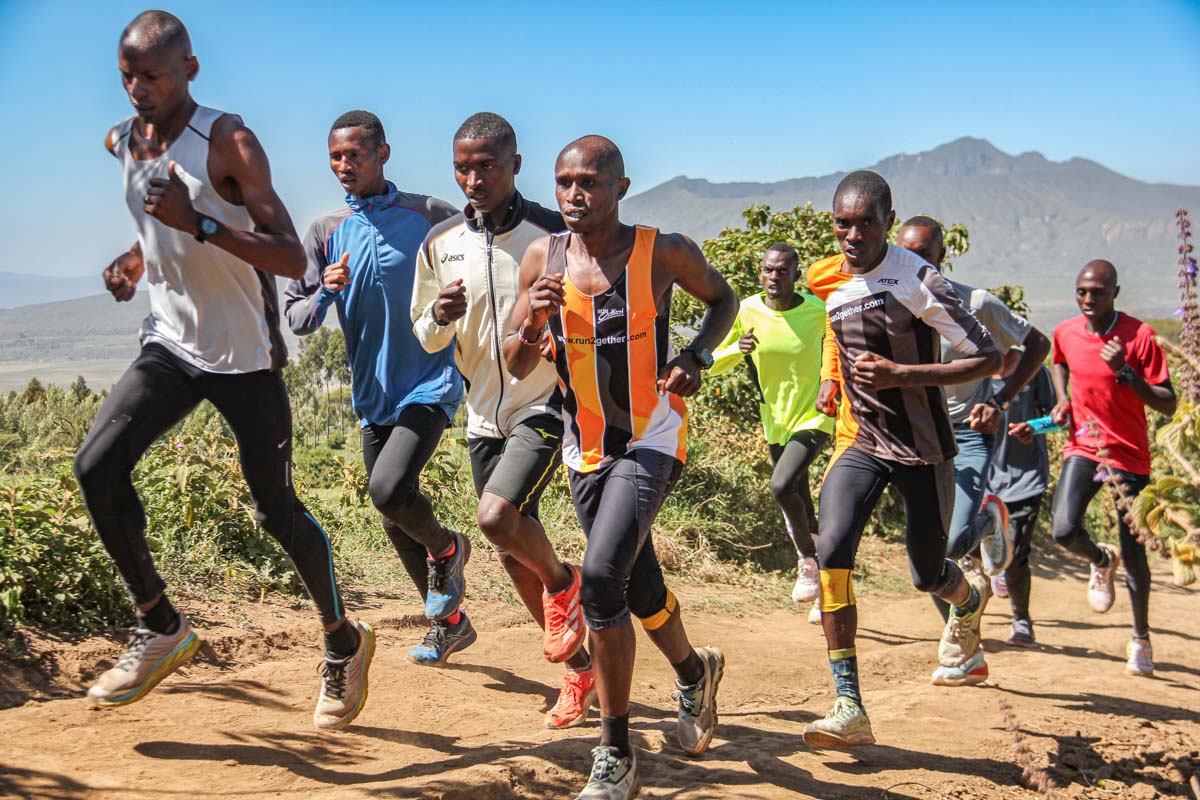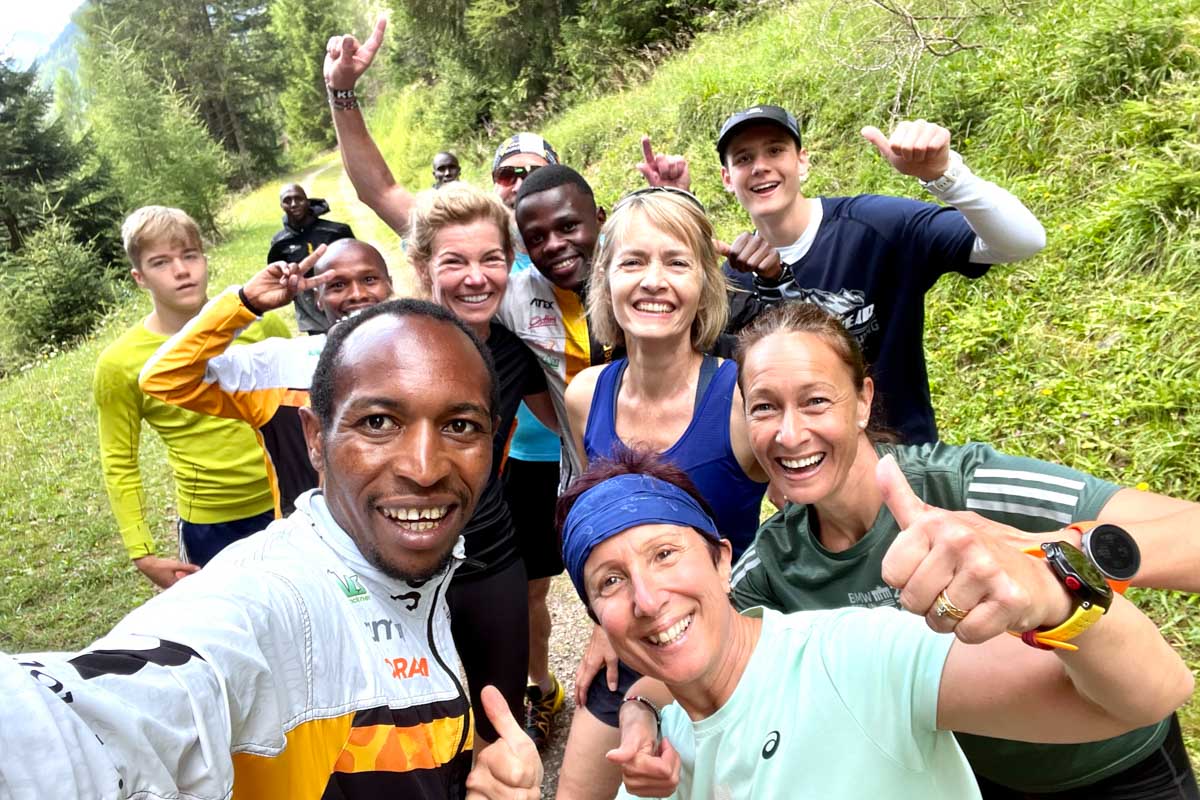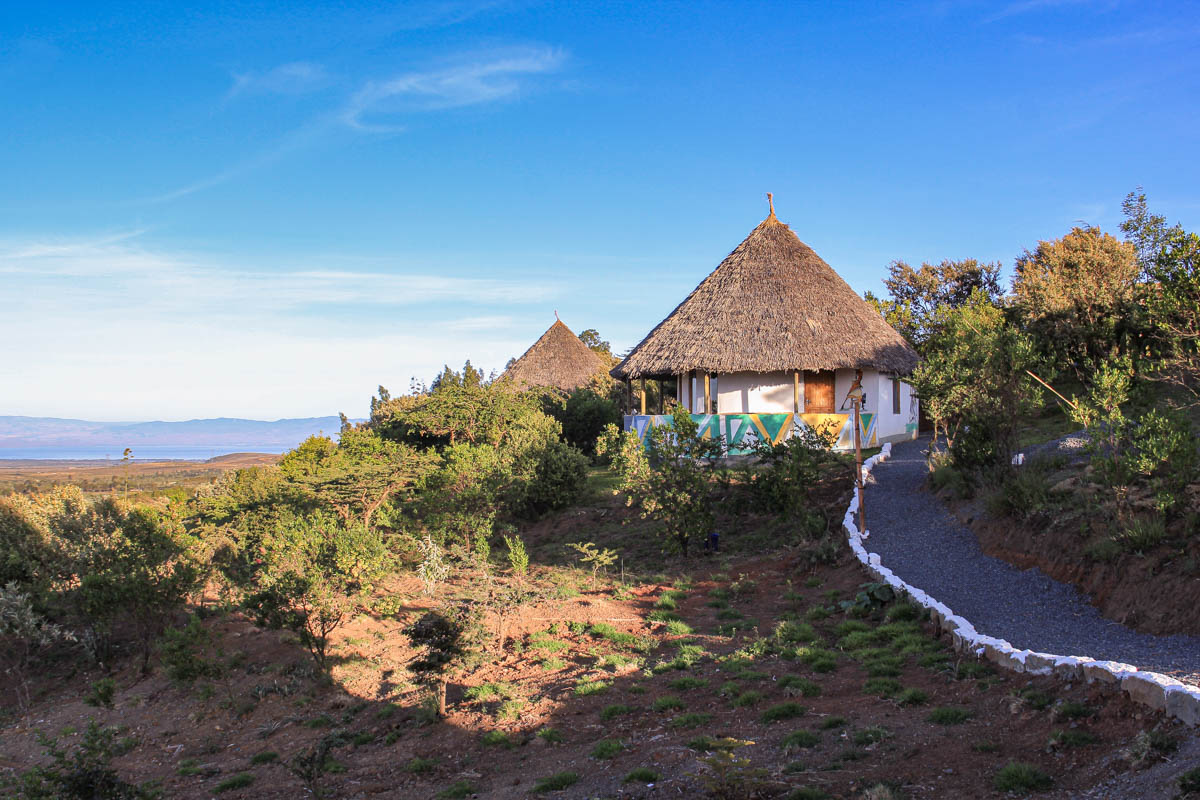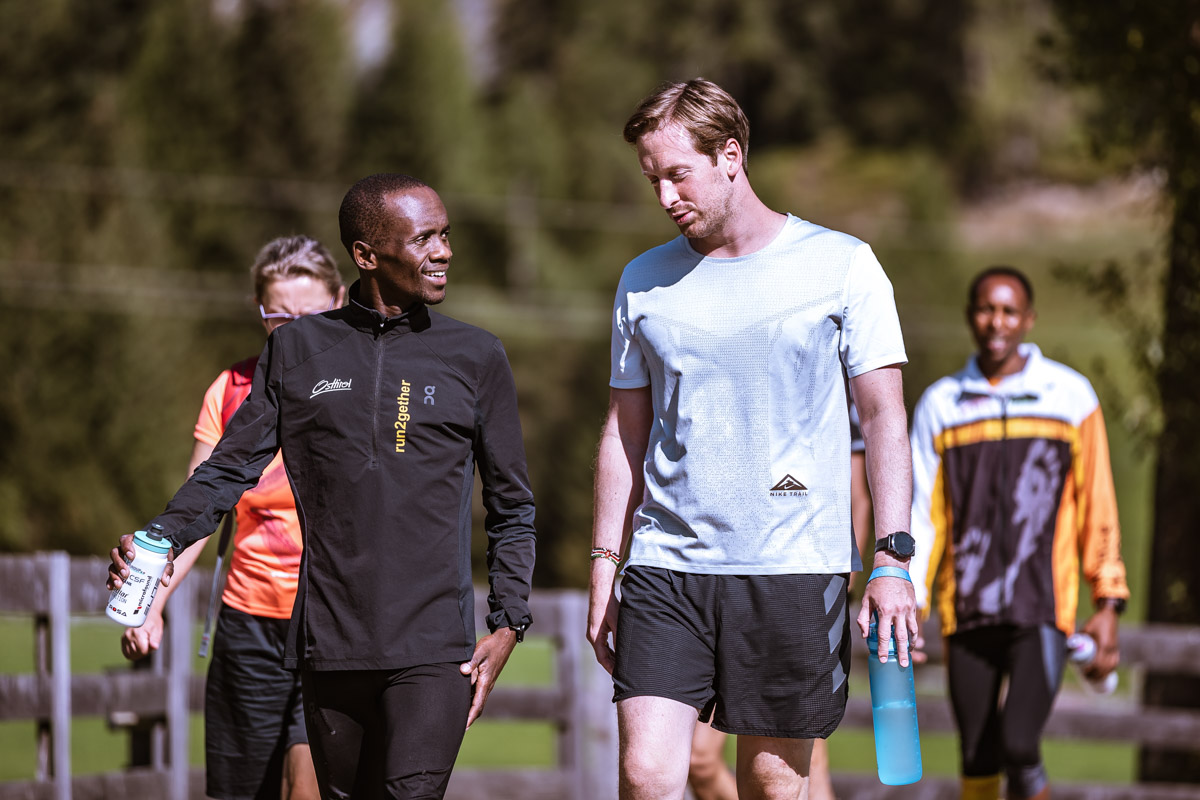There’s a photo from the 2025 Sierre-Zinal, the iconic Swiss mountain race, of Patrick Kipngeno running up a hill with a man sprinting behind him, looking positively ecstatic at the situation. Kipngeno would go on to finish second at the event behind his teammate, Philemon Kiriago. The man behind him in the photo is Thomas Krejci, the founder of the team that both Kenyans run for, called run2gether.
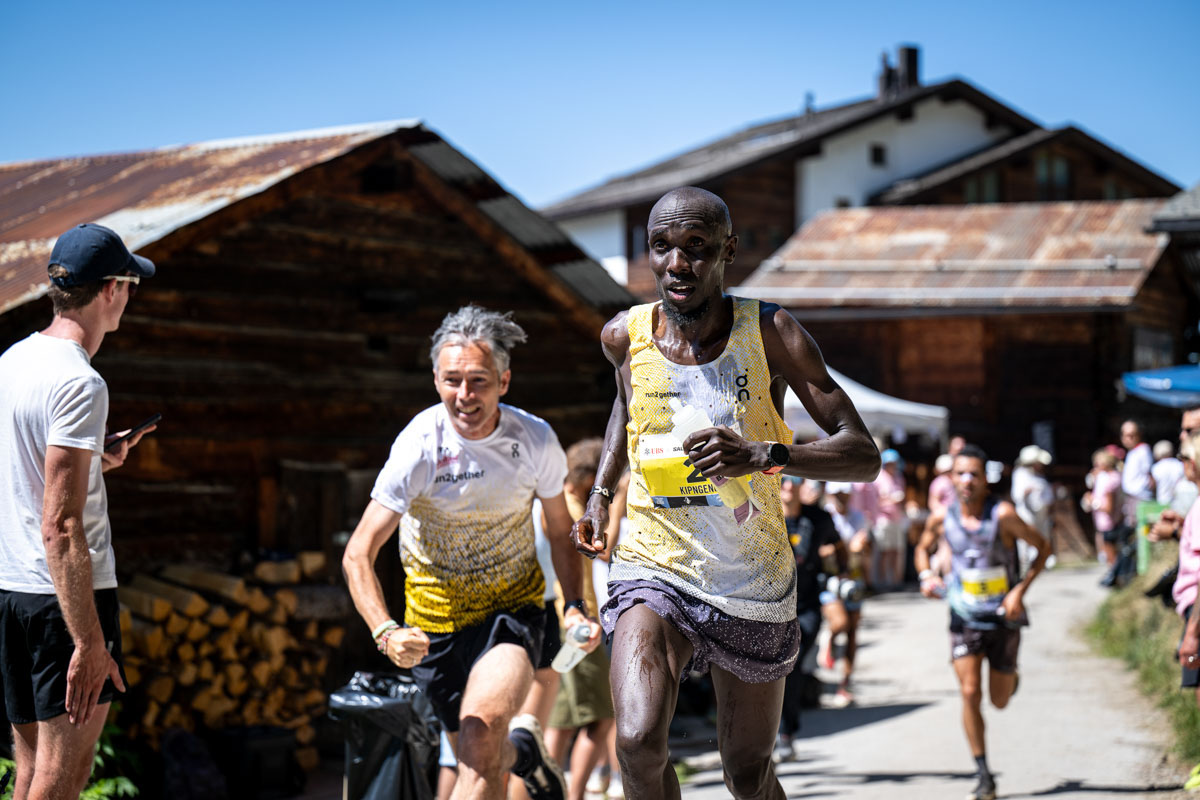
Thomas Krejci chases after Patrick Kipngeno during the 2025 Sierre-Zinal. Photo: WMRA/Marco Gulberti
What originally started in 2008 as a way for Krejci to invite a Kenyan friend to Europe to race, the run2gether program now has a roster of 56 elite athletes and has been successful at bringing Kenyan athletes to some of the biggest trail and mountain races in the world, including the Golden Trail World Series and Mountain Running World Cup. Kipngeno finished second overall at the 2024 Golden Trail World Series and won the 2024 Mountain Running World Cup, and Kiriago also finished fourth and third, respectively, in the two series last year. With only one race left of the 2025 Golden Trail World Series, Kipngeno and Kiriago sit second and third in the series, respectively, and Kiriago has won the now complete 2025 Mountain Running World Cup.
With the 2025 summer racing season coming to a close, many run2gether athletes will be lining up to represent Kenya at the World Mountain and Trail Running Championships in Canfranc, Spain, at the end of September.
Operating as a non-profit, run2gether is different from other top teams supporting athletes at the highest level of trail and mountain running. It’s staffed only by volunteers, including Krejci, with only a few paid staff members to help with the ever-growing organization. It is funded largely by hosting running camps in Austria and Kenya, where paying guests have the opportunity to train and live alongside Kenyan athletes.
While the program’s origins were small, with minimal sponsorship and an even smaller budget, it’s grown into something that has nurtured and retained some of the top talent in the sport. The 44-person men’s team includes Richard Omaya Atuya, Kipngeno, and Kiriago. The 12-person women’s team has standout names too, including Gloria Chebet and Philaries Jeruto Kisang.
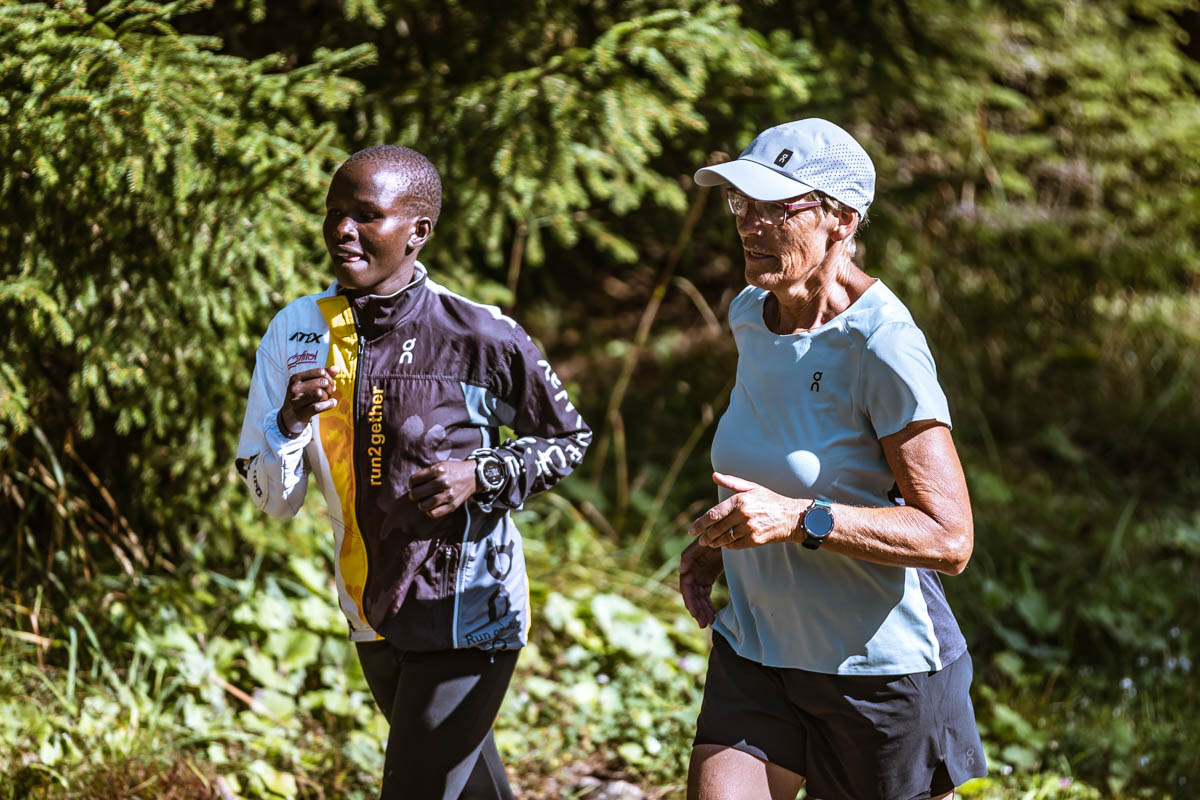
Philaries Jeruto Kisang (left) training with a run2gether guest. All photos courtesy of Thomas Krejci unless otherwise noted.
A Trip to Africa
It might come as a surprise that Krejci, whose life is now largely focused on operating run2gether on two continents, was never a pure runner in any discipline of the sport. Instead, growing up, Krejci found himself heavily involved in orienteering, which required a lot of running on all types of surfaces but with the added skill of navigating by map and compass to specific locations. Mountain running was naturally a part of his training, and he was part of the Austrian Orienteering National Team for several years, placing as high as 13th at the sport’s world championships.
In 2007, Krejci decided he wanted to improve his running skills and speed, and his attention fell on Kenyan runners. He says, “I was always fascinated when I saw Kenyan runners in the marathons, and I was curious how it feels to train in Kenya and to see behind the athlete, to see where they are living, how are their circumstances.”
Krejci had recently finished his studies in cartography and was looking for an adventure before he started a career. An Austrian running club had an exchange partnership with a Kenyan club, and he convinced two of his friends to make the trip to Africa with him. During that first trip, he met Geoffrey Gikuni Ndungu, a Kenyan runner, and the two immediately became close friends. Krejci notes the conditions that Geoffrey trained in, saying, “He was young and talented. He was running barefoot in the beginning. The time with him, for me, it was amazing, and it changed a lot of things in my life.”
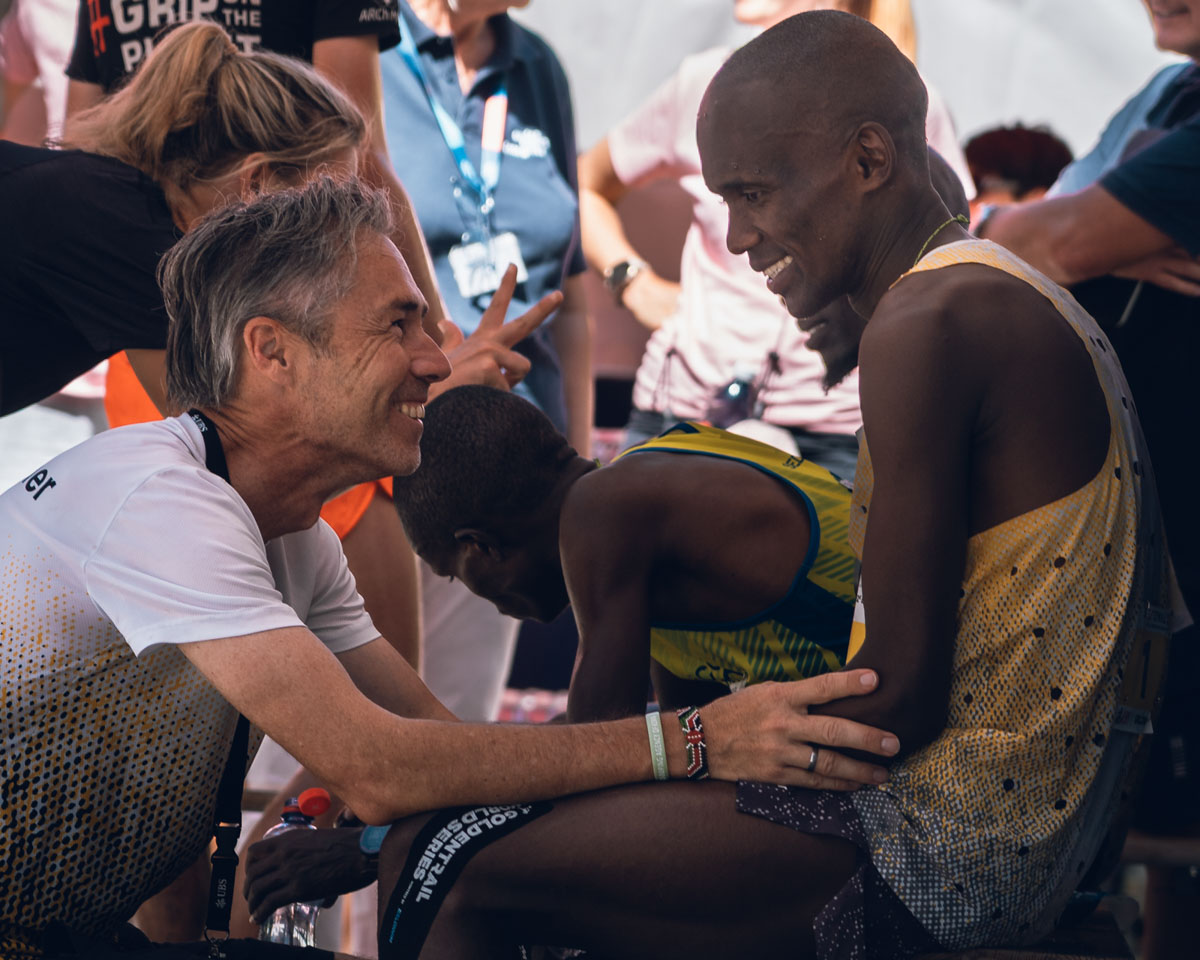
Thomas Krejci congratulates Philemon Kiriago after his win at the 2025 Sierre-Zinal. Photo: Merlin Outdoor Photography
After just a short time back in Austria following that trip, Krejci returned to Kenya to continue to train with Geoffrey. He says, “It was a completely different world, different culture. We had no water. His home is very far from electricity, very far from roads, and the time was amazing.” Krejci was welcomed into Geoffrey’s family and community and was struck by their generosity. He says, “[Geoffrey] was a teacher at that time, but as a teacher in Kenya, I think he earned less than 100 Euro per month, which even for Kenya is not much.”
Krejci wanted to try to help further his friend’s running career by bringing him over to Europe to race and compete for prize money, so he went home and devised a plan with some friends. The group didn’t have the money to finance the flight and accommodations, but they thought that perhaps European athletes, elite and non-elite alike, could benefit and learn from training with Kenyans. In 2008, they set up a camp in Hebalm, Austria, to bring together paying European runners with Geoffrey and a few other Kenyans for a week of running.
The model worked, and in 2009, Krejci officially founded run2gether as a non-profit. That second year, the number of guests they hosted at their running camp doubled.
Initially, Geoffrey was focused on road running, both the marathon and half-marathon distances. But in 2009, Krejci learned that Austria’s Großglockner Mountain Run had prize money, and since he and Geoffrey had been training in the mountains together, he convinced his friend, as well as two other Kenyans, to give it a try. Krejci proudly describes what happened: “We went there, and at that time, Jonathan Wyatt was reigning mountain running world champion, and he was racing there, and Geoffrey won the race ahead of Jonathan, a new course record.” It was a bit of a revelation, and Krejci immediately saw the potential. The two began signing up for both road and trail events.
Growing run2gether
If Krejci had initially planned on going back to a more traditional life after his initial training trip to Kenya, his plans were quickly derailed. Since 2008, the run2gether program has grown into one that supports more than four dozen elite Kenyan athletes, operates running camps and a training facility in Austria, and has opened a training center in Kenya that also has a school and nursery program. Krejci says, “Nowadays, there are so many people and kids and everything involved that it’s impossible to stop it even if I want, but I don’t want it to stop, but it has become something.”
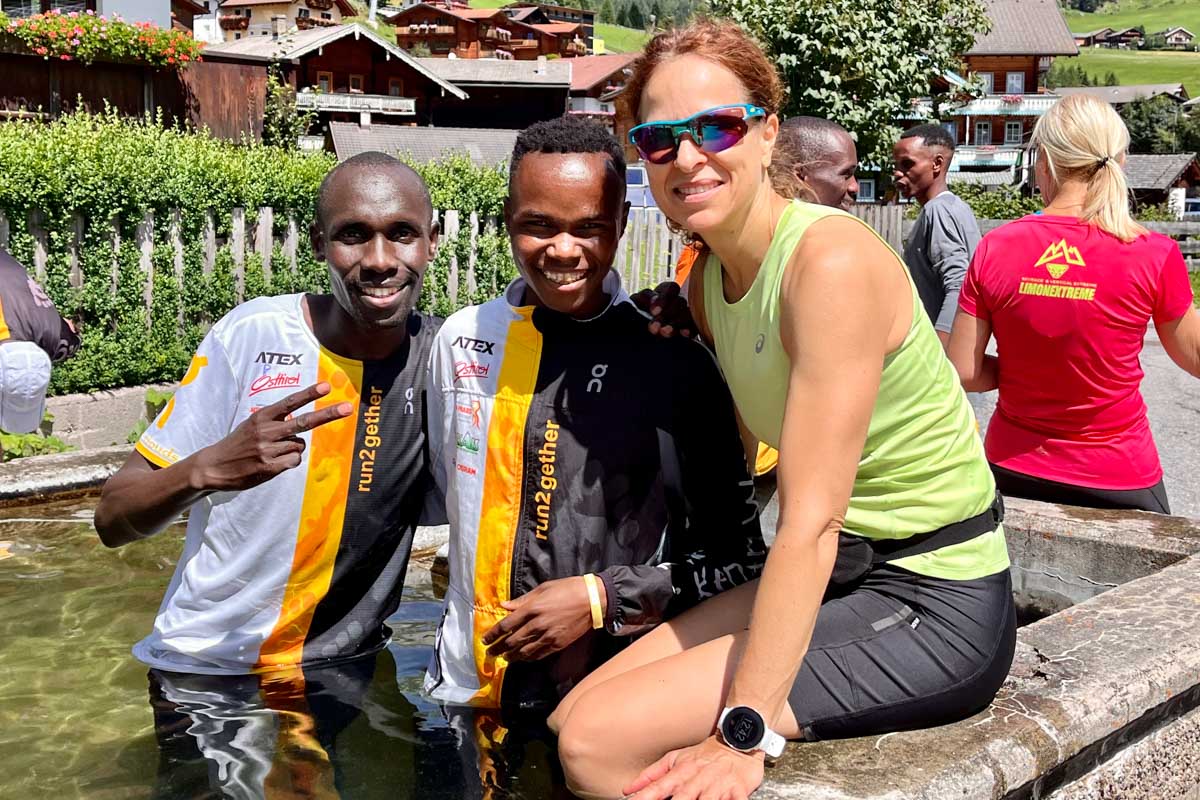
Patrick Kipngeno (left) recovers after a training run with a run2gether guest in Austria. Photo courtesy of Thomas Krejci.
As with many passion projects, run2gether started small. Seeing Geoffrey’s initial success in Europe, Krejci wanted to create a more sustainable program to help him and other Kenyans come to Europe and race on both the road and trails. Krejci continued to work as a cartographer to make a living, funneling any money that came to run2gether straight back into the program.
Now, run2gether is a well-established non-profit, and they have space for 25 guests and up to 20 Kenyan athletes in their Austrian camp at the foot of Großglockner. The high-altitude location allows for training at anywhere from 1,300 to 2,400 meters.
It was friendship and the sharing of cultures that initially drove Krejci to invite Geoffrey and his friends to Europe, and he held those same values while building the run2gether program into what it is today. Nearly 18 years after meeting in Kenya, Geoffrey is the godfather to Krejci’s seven-year-old son, and their friendship remains strong.
Krejci fosters a culture at the camps that ensures that everyone interacts. “We are cooking together. We prepare Kenyan food. There is tea time with Kenyan tea. So we share everything.”
The Kenyan athletes also run alongside the paying guests, offering encouragement and advice. Krejci calls most of his guests “fun athletes,” or people of all abilities who are looking to run and spend time in the mountains, most without elite-level goals. “They are focusing to run a marathon under five hours, or there are some guests who are even walking, so it’s really the whole range of runners from professionals up to totally fun runners, or even some who only want to meet Kenyans and to eat Kenyan food, or to get involved in a different culture and different views.” Krejci says, “It’s different motivations, but still running brings us together and makes it amazing to spend one week with different kinds of people.”
Giving Back to Communities
After just two years of hosting his running camps in Austria, guests suggested Krejci set up a similar program in Kenya. He said, “Many of those guests joining us, they asked me, ‘How is life in Kenya, and how are the athletes living there? How are the circumstances?’ And I discussed with Geoffrey, how can we invite Europeans to come there because there is no hotel and no accommodation, nothing. So then we decided, ok, let’s build something by ourselves where we can welcome Europeans to stay there, close to his home.”
Staying true to his ideals of creating a culturally immersive experience, Krejci set up a high-altitude Kenyan training camp at 2,380 meters to bring outside runners to the region, but he did it without all of the bells and whistles of more traditional all-inclusive trip packages. In 2010, their facility had room for six guests staying in double rooms and about 30 Kenyan athletes. Now, 15 years later, they have space for 30 guests and up to 50 Kenyan athletes. Guests come for anywhere from a few days to several weeks to train and prepare for marathons and trail races, and they have the opportunity to visit the surrounding areas, including the five nearby national parks.
Of the run2gether Mt. Longonot Sports and Recreation Center, Krejci says, “I think because it’s the only place where Europeans, people from U.S., or somewhere else, they stay really together with the Kenyans in one place.” Krejci worked hard to create an environment where his guests could have a meaningful experience. “There is no menu when you stay with us. So, you get the food the runners are eating. It’s important for me that it fits to the area because I don’t want to have a hotel with a swimming pool or something like this, and 100 meters outside, people are suffering because of not having enough water, for example.”
Run2gether uses the money from the program not only to support Kenyan runners but to give back to the local community as well. Krejci says, “In 2013, we built a school just 100 meters beside the camp. They also run a nursery school.” Krejci goes on to say, “We built water stations. We were digging bore holes. We do all this for the community around the camp.” Krejci says that the program has spent more than 1.3 million Euro in the past 15 years on social activities and has paid school fees for 400 children, thanks to personal sponsors for each child.
Supporting Elite Athletes
While run2gether funnels money back into Kenyan communities, its main focus remains on supporting elite Kenyan athletes. Krejci says, “I want to help young ones to develop their talent and help them reach their personal limits.”
In addition to providing a training base in Europe and access to races, Krejci also helps Kenyan athletes with other aspects of living outside of their country, including providing public relations training. He says, “We try to train them in giving interviews here in our camp with our guests. We make a press conference where the guests can ask some questions, which they might be asked the coming weekend when they go for competition, to help them get used to it.” He also tries to help with differences in cultural norms. “It’s really very difficult, for example, [for a Kenyan to] look in someone’s eyes. In Kenya, it is not polite, especially if you are a girl.”
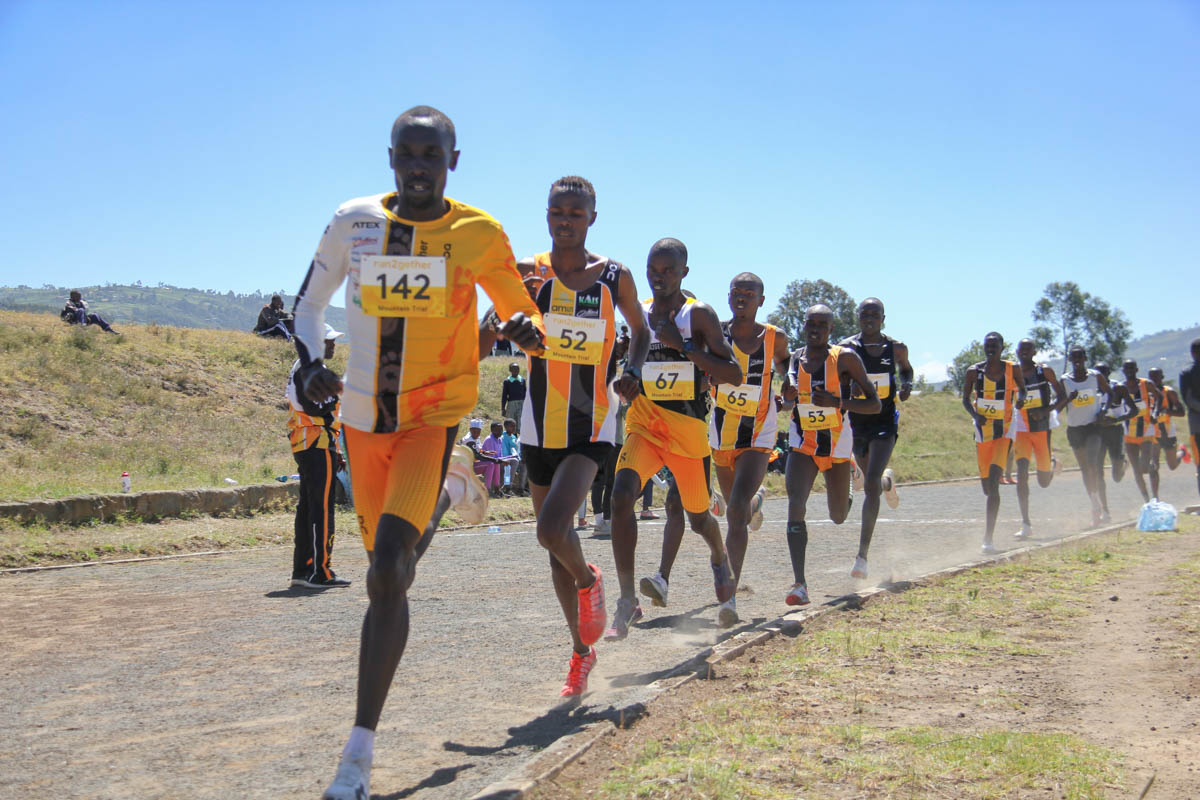
Runners participate in a trial at the run2gether facility in Kiambogo, Kenya. Photo courtesy of Thomas Krejci.
When run2gether athletes have finished their racing careers, Krejci strives to make sure that they’re taken care of by finding employment for them at one of the camps if they want to stay around. Krejci says, “Of the 15 people being employed in the camp, I think 10 out of them are former athletes. For example, Geoffrey is now the local manager, and he’s coaching the mountain and trail runners after he stopped two years ago with his own [racing] career, due to injuries.”
Krejci realizes that not every Kenyan runner will become a superstar able to make a living from running, so he strives to provide other pathways for current and former athletes to make money, including coaching and helping at the camps. Krejci says, “The main thing that is important in run2gether is that the athletes, either they perform well in competitions and then they win prize money and finance their life, or they have a good job by coaching European fun runners, and they get some money for doing this.”
Ongoing employment is one way that Krejci encourages his higher-profile athletes to stay with the program, even in the face of potentially more lucrative but shorter-term contracts with other teams. Krejci says, “I tell them if they stay with us, it’s not only the time they are competing. We really try to support them when they stop running or when they have an injury.”
The Future
While Krejci isn’t afraid to voice his disappointment about athletes who have left his program to chase bigger contracts, he understands that it’s all part of the game. He says, “I thought I could be a close friend to all of our athletes, and then I had to realize, and it was painful sometimes, that people left our team because of better offers from other brands.” Krejci feels that with the current size of the program and sponsorship from the brand On since 2010, he’s able to offer his top athletes contracts that are competitive with other teams in the mountain running world.
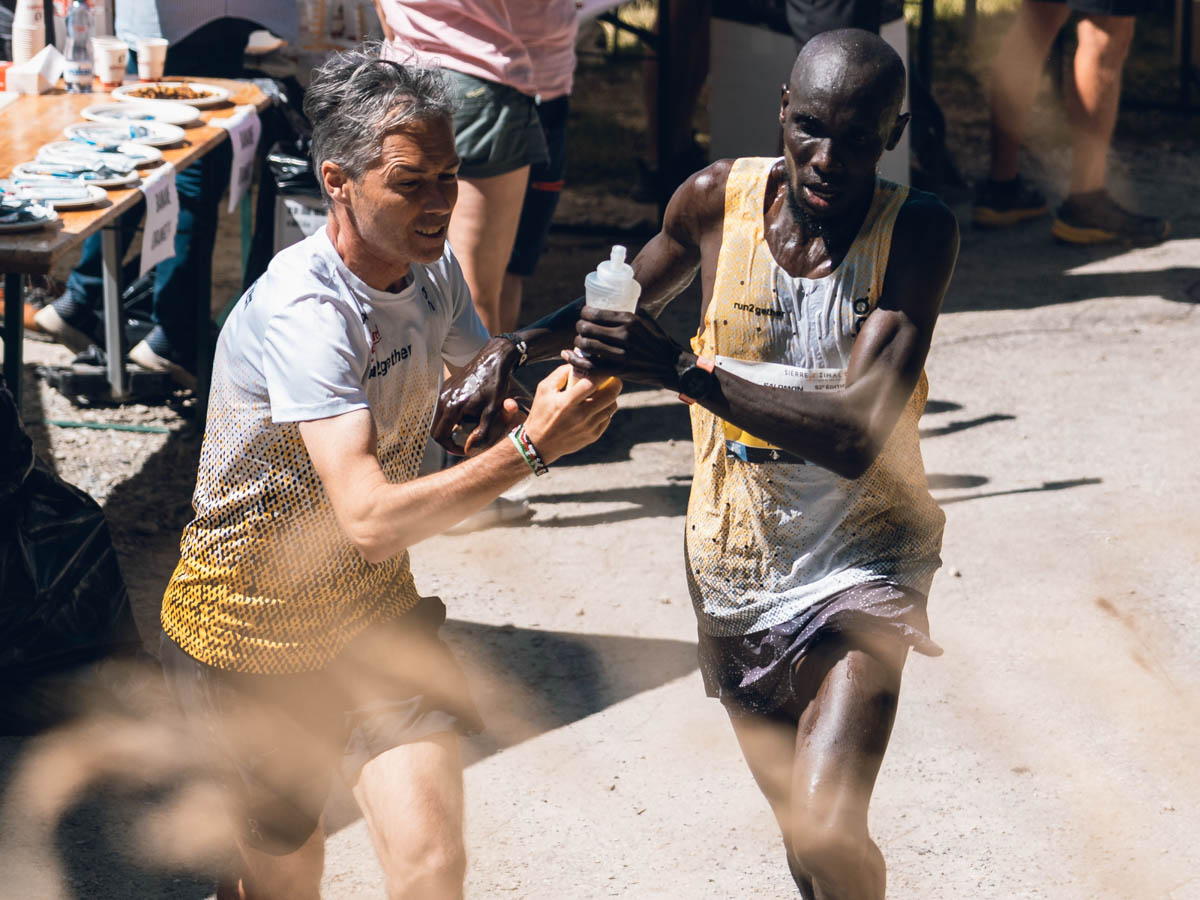
Thomas Krejci passes off water and nutrition to Patrick Kipngeno during the 2025 Sierre-Zinal. Photo: Merlin Outdoor Photography
Krejci still stays involved with the lives of all the athletes involved with run2gether, splitting his time between the Austrian base and the Kenyan one, often with his family at his side. He’s clearly proud that the program has grown far beyond what he ever set out to do.
This September, when athletes from around the world line up for the various races at the World and Mountain Running World Championships in the Spanish Pyrenees, the Kenyan team will be bolstered by runners from run2gether, a program that has made a huge impact on both Kenyan off-road runners and the sport of the mountain running with a team model that is unlike any other.
Call for Comments
- What do you think of run2gether’s unique way of funding an elite Kenyan mountain running team?
- Will you be following the run2gether athletes at the World Mountain and Trail Running Championships?
